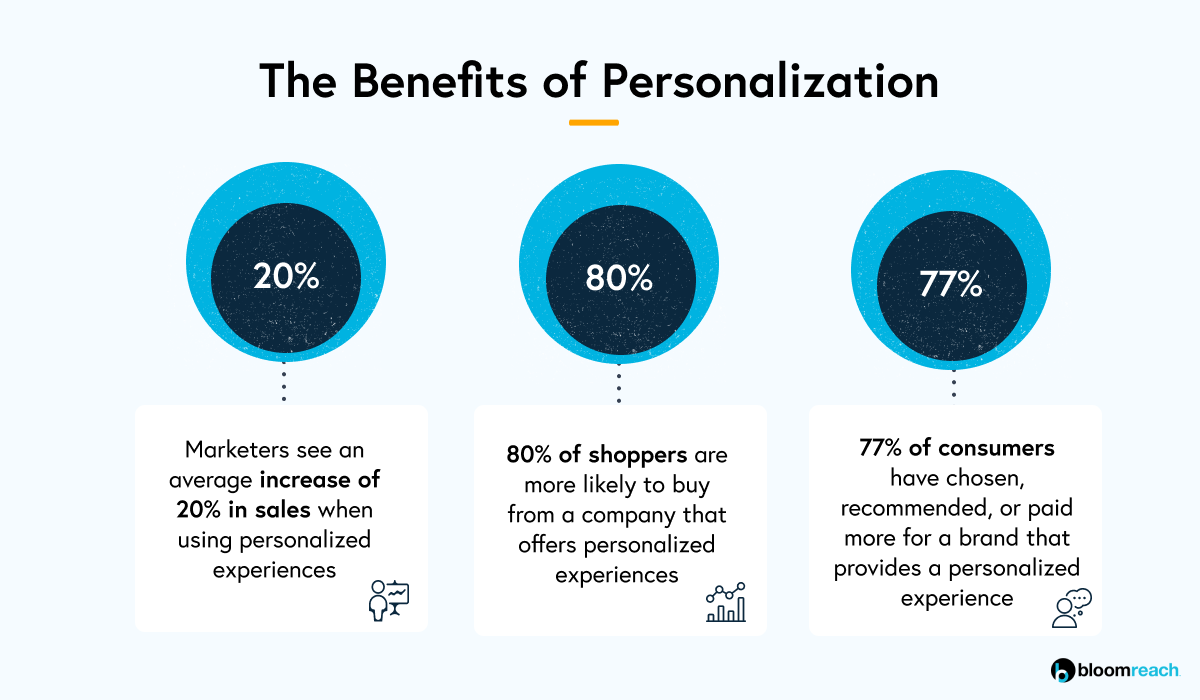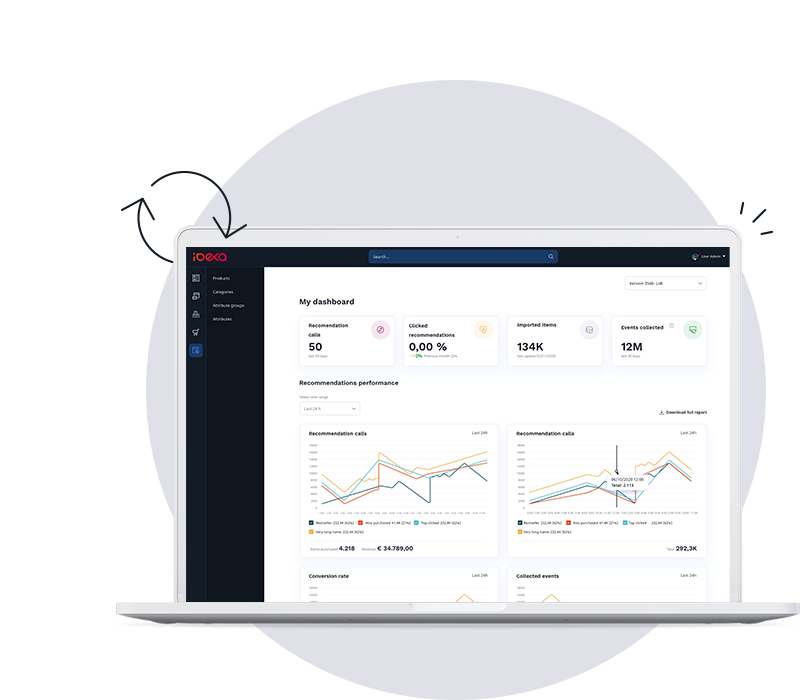
DXP: The Power of Customization
USER EXPERIENCE, TECHNOLOGY OF EXPERIENCE.
Companies are looking for a direct connection with their customers, which allows them to improve loyalty and achieve higher profits. Analyzing and understanding the needs of their customers is a complex activity that goes beyond implementing mass marketing strategies, since it implies providing a more personal interaction.
How do you determine what the customer really needs, and how do you present a customer with products or services that are relevant to him or her? Each person expects personalized experiences, so personalization in digital experiences becomes necessary in today's competitive retail environment.
Establishing and strengthening relationships with customers creates solid experiences that attract and hold their attention for longer.
How DxP allows you to customize your content
The term personalization refers to offering a range of differentiated products and services for each type of customer. In other words, providing relevant content to a specific user or audience in real time, with the aim of creating a unique experience tailored to the customer's individual needs.
You can personalize products, promotions, advertising, websites, mobile applications and so on, but for this you need to know the behavior of users. Demographic information such as user name, age, gender and geographic location are important characteristics that allow you to establish direct contact with the customer and increase customer loyalty.
Customers are no longer looking to simply be part of a market segment that receives hundreds of advertising emails or text messages, today, they want to feel unique, to have the attention of their preferred brand, so the more special you make your customer feel, the more likely they are to buy.
However, what if instead of sending an email with your customer's name on it, you try to program these messages to speak directly to them? In an ever-changing environment the basic concept of personalization does not cover all consumer requirements.
For this reason, it gives rise to 'hyper-personalization', seen as a next level that provides your customers with only the information they really need at any given time, through the channel they use the most and according to their specific desires.

It is no longer enough just to know the basic data of your customers, it is now necessary to analyze their interests, their browsing behavior, buying habits, the pages they visit the most, the products they frequently search for, all with the aim of collecting information to increase interaction and design customized strategies for each individual.
To illustrate this innovative concept, imagine yourself as a customer, have you ever noticed how just by searching for a product on Google you start to receive advertising information about promotions for the same or similar products, have you ever thought why when you go to YouTube you get song suggestions about the genres you listen to the most?
Are you happy to receive e-mail messages about items you forgot in your shopping cart on a website?
All these experiences are the goal of hyper-personalization, going beyond the basics, adapting to customer preferences, establishing contact with them and obtaining greater visualization. Mass customization is becoming a thing of the past to drive direct communication with each customer.
This is what determines the success of any portal today: ensuring an excellent customer experience.
How can you do it? The basis of everything is to know your audience:
Find out the requirements of each customer and their needs in order to personalize offers and communication, i.e. store all relevant information.
Analyze these data at the individual level.
Apply technologies that allow you to segment your customers and send them the content they really want to see and interact with.
All this is possible with DXP, digital experience platforms. If you are here, this concept probably already sounds a little familiar to you. With the advent of new technologies, such as artificial intelligence and virtual reality, it has become possible to capture consumer needs and preferences and even anticipate them.
What does and does not a DXP offer?
Digital Experience Platforms (DXP) are a set of integrated technologies that together provide personalized access to customer information through the use of different means of contact and digital channels such as websites, portals, mobile devices, among others.
A DXP allows you to:
Provide all its users with unified, timely and continuous access to all relevant information to provide services in a more efficient way.
Combine different applications and web services to provide unique digital experiences to your customers (omnichannel experience) strengthening their loyalty.
Optimize internal business processes to accelerate customer interaction.
You should keep in mind that a DXP allows you to manage content, customize it and deliver this content in different channels massively.
DXPs should not be confused with digital commerce platforms. Their performance capabilities enable a wide range of functions that evolve and converge to support individualized digital experiences.
Components such as e-Commerce, CRM, automated marketing, digital asset management, among others, are additional elements that can be integrated into a digital experience platform to increase its effectiveness.
To achieve this, a DXP is made up of a flexible grouping of modules through the use of tools such as Application Programming Interfaces (APIs). An API is used to enable two software applications to communicate with each other.
They are currently used to connect and automate services to create great customer experiences. But how can an API transform the experience of your users?
Quite simply, APIs are present in almost all the digital channels that a customer frequents: applications, social networks, websites, portals, etc. Using them allows you to design the omnichannel experience that DXP offers your customers.
Giving customers what they need is profitable:
"Get closer than ever to your customers. So close, in fact, that you can tell them what they need before they know it for themselves." Steve Jobs.
Companies improve their profitability by establishing their customers as the main pillar. Business development involves knowledge from the outside to the inside, focusing efforts on recognizing what the customer needs to give rise to innovative ideas to improve the performance of a company.
Furthermore understanding customers contributes to continuous improvement, facilitates decision making and the identification of problems in your organization. This then proposes another important task in this world of personalization: effective customer segmentation.
In addition to knowing the customer and analyzing the data, a third important step is to segment them according to the content each group wants. Your customers can be very varied, so being able to distinguish between different groups with similar characteristics makes it easier to approach them and create customized content delivery programs for each selected group.
The importance of automating content delivery
The competition for customer service is increasingly challenging, so delivering the right content to your customers becomes a critical activity. Everything is a continuous process towards personalization. For example, Contentful helps you organize and structure the content you want to show your customers.
For example Contentful is a pioneering headless CMS platform that allows you to create digital experiences with structured and unified content in one place. With this platform it is possible to manage and publish your content in an omnichannel way and with the ability to scale your business easily and quickly.
Another example of this is what you can achieve with a DxP like Ibexa. Ibexa's digital experience platform allows you to achieve a personalization experience for your customers by collecting and analyzing data and customizing content for each user.

Ibexa DXP allows you to:
Track customer behavior: website visits, products purchased, links of interest, frequent searches, etc.
Personalize the analyzed content according to the types of users (segmentation).
Recommend content to your customers according to the preferences found for each segment.
Generate innovative sales strategies in a sustainable manner.
Create content, websites and e-commerce platforms specific to your customers.
Create memorable experiences for all your users in different digital channels.
Unify your business processes: branding, content, product information, commerce.
Ibexa DXP has a reliable and secure system with important allies that guarantee the functionality of the tools it offers and with the support of different international brands that trust Ibexa as their strategic partner.
Aplyca and its customization projects with DxP
If you think it is time to switch to a DXP like Ibexa or improve the digital experience with technologies like Contentful to grow your business and offer a personalized and engaging experience to your customers do not hesitate to contact us. At Aplyca we are able to help you achieve it.